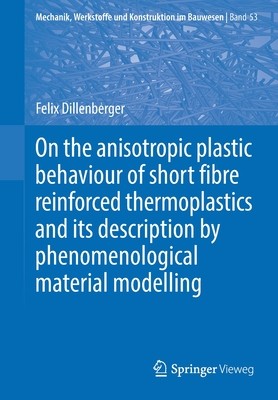
- We will send in 10–14 business days.
- Author: Felix Dillenberger
- Publisher: Springer Vieweg
- ISBN-10: 3658281987
- ISBN-13: 9783658281984
- Format: 17 x 24.4 x 1.3 cm, softcover
- Language: English
- SAVE -10% with code: EXTRA
On the Anisotropic Plastic Behaviour of Short Fibre Reinforced Thermoplastics and Its Description by Phenomenological Material Modelling (e-book) (used book) | bookbook.eu
Reviews
Description
A requirement for the safe design of thermoplastic parts is the ability to precisely predict mechanical behaviour by finite element simulations. Typical examples include the engineering of relevant components in automotive applications. For this purpose adequate material models are essential. In this context, the present work introduces a material modelling approach for short fibre reinforced thermoplastics (SFRTPs). SFRTP parts are processed cost-effectively by injection moulding and show a varying degree of anisotropy due to the locally inhomogeneous fibre distributions that arise during the moulding process. The presented material model considers linear-elastic behaviour and non-linear orthotropic stress-state dependent viscoplastic deformation for arbitrary fibre distributions. The constitutive equations are verified with the experiments of a PPGF30 material regarding different stress-states and orientations.
EXTRA 10 % discount with code: EXTRA
The promotion ends in 20d.07:50:26
The discount code is valid when purchasing from 10 €. Discounts do not stack.
- Author: Felix Dillenberger
- Publisher: Springer Vieweg
- ISBN-10: 3658281987
- ISBN-13: 9783658281984
- Format: 17 x 24.4 x 1.3 cm, softcover
- Language: English English
A requirement for the safe design of thermoplastic parts is the ability to precisely predict mechanical behaviour by finite element simulations. Typical examples include the engineering of relevant components in automotive applications. For this purpose adequate material models are essential. In this context, the present work introduces a material modelling approach for short fibre reinforced thermoplastics (SFRTPs). SFRTP parts are processed cost-effectively by injection moulding and show a varying degree of anisotropy due to the locally inhomogeneous fibre distributions that arise during the moulding process. The presented material model considers linear-elastic behaviour and non-linear orthotropic stress-state dependent viscoplastic deformation for arbitrary fibre distributions. The constitutive equations are verified with the experiments of a PPGF30 material regarding different stress-states and orientations.


Reviews